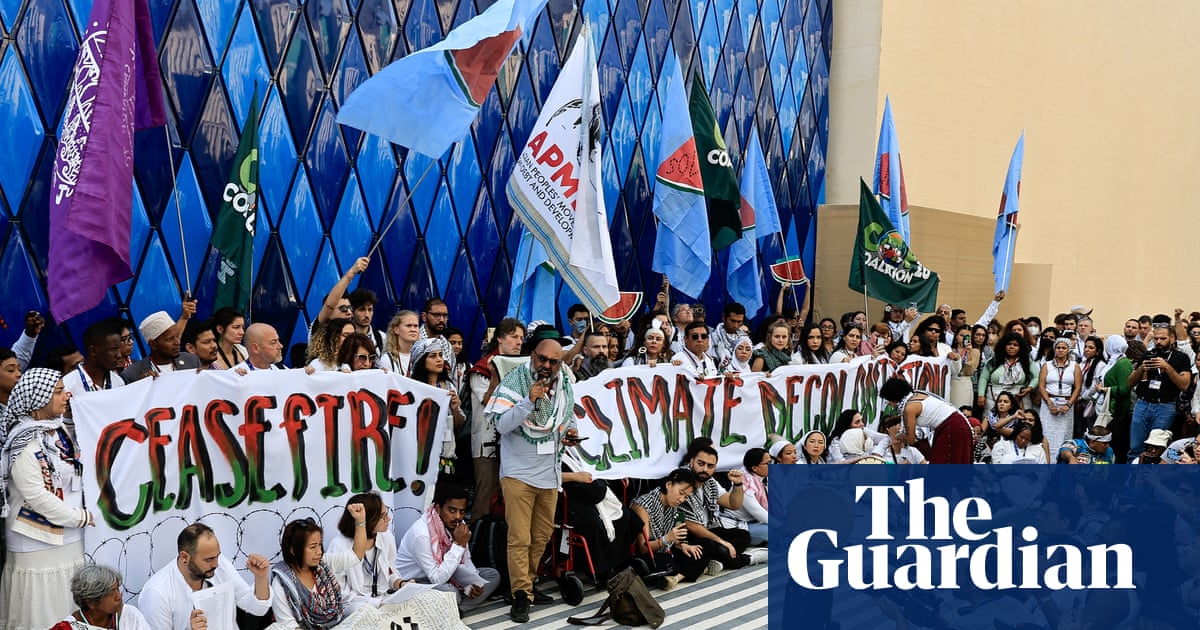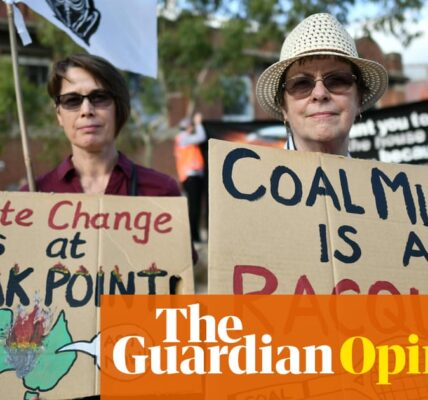The intersection of climate activism and peace: Gaza takes center stage as a symbol of climate justice.

In October, when Greta Thunberg shared a picture on Instagram of herself holding a sign that read “stand with Gaza,” she faced swift and severe criticism from both Israel and Germany.
A representative from the Israeli Defense Forces (IDF) originally stated to Politico that anyone who supports or relates to Greta in the future is a supporter of terrorism, but later retracted this statement. The official Israel account claimed that Hamas does not use environmentally friendly materials for their rockets and encouraged Thunberg to advocate for the victims. The Israeli education ministry announced that they will remove any mention of the Swedish climate activist from their curriculum.
German politicians and commentators from various political backgrounds called for the local branch of Fridays for Future, a student protest movement founded by Thunberg in 2018, to distance themselves from her beliefs. The group released a statement reaffirming their support for Israel’s right to exist, and in the subsequent weeks, made it clear that they do not share the same views as the international group’s social media posts. Der Spiegel, a prominent news magazine in Germany, published an extensive piece featuring personal remarks on Thunberg’s childhood character and appearance, titled “Has Greta Thunberg betrayed the climate movement?”
The recent outbreak of violence between Israel and Gaza has unexpectedly become a focal point for climate activists from wealthy nations. As global leaders gather for the Cop28 conference in Dubai, the various movements, which have championed inclusivity and global fairness, are split on whether to address the conflict and how to do so.
Different stances have caused divisions both within and among groups. According to Stefan Aykut, who heads the Center for Sustainable Society Research at the University of Hamburg, the discussions at a national level are not focused on the actual conflict, but rather influenced by the prevalent cultural perspective within each society.
The history of the Holocaust, which was perpetrated by the Nazis, plays a critical role in shaping Germany’s identity after World War II. Recently, this history has been used to support the idea that Israel’s safety is closely connected to Germany’s current state. While environmental organizations in Germany have shown support for Israel during the ongoing conflict, they have also expressed compassion for the suffering of Palestinians. On the other hand, activists in the UK and US have been more vocal in their criticism of Israel’s actions, with some even labeling it as “genocide” (a term that Israel denies) and urging their governments to demand a lasting ceasefire.
Environmental organizations located far from the conflict are facing increased pressure to publicly declare their stance, as instances of discrimination against Jewish and Muslim communities have risen in the United States and Europe. This has also heightened the importance of conveying a sensitive and appropriate message.
Some people were upset about Thunberg’s post because of a blue octopus toy shown in the background. The toy represents neurodiversity and is often used by individuals with autism to express emotions. However, it also resembles a symbol associated with racist propaganda that wrongly suggests Jews have control over the world. Thunberg, who has autism, was not aware of this connection and replaced the photo with one that did not include the toy.
Thunberg faced backlash for not denouncing Hamas or showing support for its victims while simultaneously speaking out against Israel.
Sharona Shnayder, a climate activist from Nigeria and Israel, who experienced the loss of friends during the Hamas terror attack at a music festival near the border of Israel and Gaza, expressed her disappointment: “She didn’t acknowledge it until people pointed it out. It was painful in a way that words cannot fully explain.”
Shnayder, the creator of Tuesdays for Trash, was motivated by Thunberg and has noticed a lack of empathy towards Israeli victims of the war in international discussions, which has caused local activists to feel disconnected. “I often discuss the issue of litter and waste management. But in that moment, I couldn’t help but think, ‘Do I hold no significance in this world?'”
According to the Israeli government, 1,200 individuals were killed and over 200 were taken as hostages in Israel by Hamas militants on October 7th. Health officials in Gaza report that since then, Israel has caused the death of over 15,000 Palestinians and has deprived more than 2 million Gazans of basic necessities such as food, water, fuel, and medical attention.
FFF Sweden, including Thunberg, wrote an article in the Guardian on Tuesday in response to their stance, stating that Fridays for Future did not respond to a request for comment regarding this article. They clarified by saying, “Despite what others have alleged, Fridays for Future has not become politicized or radicalized. We have always been a political movement advocating for justice.”
The German division has expressed its support for those affected by Hamas’ use of violence and for Jewish communities globally. They also acknowledge the struggles of Gazans and are deeply troubled by the surge of anti-Muslim discrimination in Germany. According to them, these viewpoints are not conflicting. They are capable of empathizing with all of these situations simultaneously.
A representative from the organization stated: “There can be no negotiation when it concerns safeguarding the lives of Jewish people and the existence of Israel. We are deeply disturbed by the harm inflicted on innocent individuals and we stand in solidarity with civilians in Israel and Gaza.”
Germany stands out compared to other wealthy democracies in its strong political and media backing of Israel’s actions. Oscar Berglund, a researcher in climate activism at the University of Bristol, stated that Germany has a unique stance in these politics.
Other organizations advocating for climate action have denounced the increasing number of deaths on both sides, refraining from identifying the parties responsible, as the death toll initially spiked and continues to climb.
Namrata Chowdhary, leader of public involvement at 350.org, stated: “We have intentionally chosen to proceed with caution and speak out in unity when it is deemed appropriate.”
The organization has requested a halt to hostilities and adherence to global humanitarian regulations. “We understand that achieving climate justice is dependent on peace, and by advocating for peace, we are emphasizing the importance of peace for all parties involved.”
Greenpeace has expressed similar requests, stating that the targeting of civilians is considered a war crime regardless of who commits it.
The recent atrocities and appropriate steps to take as a collective have been a central topic at the Cop28 conference over the past week. While two major groups advocating for environmental justice – the Palestinian Environmental NGOs network (Pengon) and La Via Campesina, an international movement representing millions of peasants, landless workers, farmers, Indigenous people, pastoralists, and migrant farmworkers – have chosen to abstain from attending the summit, others have utilized the platform to draw attention to the ongoing conflict.
During the opening day of the summit on Thursday, the UNFCCC (United Nations Framework Convention on Climate Change) abruptly ended a livestream of the event. This occurred as Asad Rehman, director of War on Want and founder of the global campaign for climate justice, spoke out in support of a lasting ceasefire. It is important to note that all protests must be approved in advance by the UNFCCC and that any mention of specific countries or companies is prohibited. Rehman emphasized the interconnectedness of the Palestinian struggle with all movements for justice, including climate justice, and expressed a desire for a liberated Palestine.
Tasneem Essop, a human rights activist from South Africa and leader of the Climate Action Network, which consists of 1,900 climate action organizations worldwide, stated: “While the ongoing genocide in Gaza may not have a direct impact on negotiations, it will contribute to the increasing divide and lack of trust between the global south and the global north.”
Several environmental justice organizations in the United Kingdom have rallied behind the Palestinian movement. One of the first groups to do so was Friends of the Earth UK, which openly declared its support for its sister organization in Palestine and their enduring stance against the occupation of Palestinian territories.
Extinction Rebellion stated on their website that the actions being taken against innocent civilians in Gaza are considered a “war crime”. The organization did not provide a comment for this article, however, autonomous actions have been taken by various XR groups. On November 11, during a Palestine solidarity march and counter-protest that coincided with the UK’s Remembrance Day, XR Parents placed numerous children’s shoes on the steps of Trafalgar Square in London and read aloud the names of the 4,100 Palestinian and 26 Israeli children who had been killed at that time.
Robin Wells, the leader of Fossil Free London, stated that her organization had generated backing for three major solidarity marches in London. They also organized their own, smaller demonstrations outside BP and Ithaca, two energy companies involved in extracting gas from disputed territories in the eastern Mediterranean, which are claimed by both Israel and Palestine.
Climate activists have been divided not only on the moral dilemma of which stance to adopt, but also on the effectiveness of advocating for issues beyond the use of fossil fuels.
Some individuals have not appreciated the change in attention. During a recent demonstration in Amsterdam where Thunberg was joined by Afghan and Palestinian women, a man interrupted by taking the microphone from her. He expressed, “I came here to protest climate change, not to hear political opinions.”
Certain environmental organizations have opted to refrain from addressing the conflict, while one stated that they had not taken a stance on past wars. Conversely, some have asserted that the issues of climate change and social justice are closely intertwined and cannot be disregarded even in the face of severe violence.
A representative from Greenpeace stated: “We believe there is both a strategic advantage and a moral obligation. Environmental concerns are rarely isolated issues. Many of the challenges we encounter are intertwined, whether it’s socio-economic disparities contributing to the climate crisis or the effects of climate change causing food costs to rise and exacerbating social injustices.”
According to Berglund, one challenge that environmental movements have encountered is their lack of clear political principles or objectives. He believes that having a climate movement without political involvement is not sustainable in the long term.
Activists are facing the challenge of potentially alienating the public and politicians they are trying to engage by not striking the right balance. During the CSS conference in Hamburg, Aykut emphasized that while the climate movement is worldwide, its influence is most significant in countries with the highest emissions.
Aykut stated that the focus is not just on uniting minority groups, but also on convincing the larger population. While intersectionality is essential for the climate movement, it cannot be solved like a math problem by continuously adding diverse groups until a majority is reached. Each time a new faction is incorporated and their concerns are addressed, there is a possibility of alienating another segment of the movement.
Source: theguardian.com

